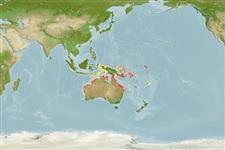Classification / Names
Common names | Synonyms | Catalog of Fishes(genus, species) | ITIS | CoL | WoRMS | Cloffa
Teleostei (teleosts) >
Ophidiiformes (Cusk eels) >
Dinematichthyidae (Viviparous brotula)
Etymology: Eusurculus: Name from Latin and Greek 'eu' for good or real and Latin 'surculus' for grapevine tendril, refers to the functional analogy with the pseudoclaspers and the specific shape of the inner pseudoclasper; pistillum: Name from Latin 'pistillum' for pistil, refers to the sucker-disk shape of the inner pseudoclasper, this resembles the shape of a flower’s pistil; noun in apposition.
More on authors: Schwarzhans & Møller.
Environment: milieu / climate zone / depth range / distribution range
Ecology
Marine; reef-associated; depth range 0 - 9 m (Ref. 76869). Tropical
Indo-West Pacific: Australia.
Size / Weight / Age
Maturity: Lm ? range ? - ? cm
Max length : 4.9 cm SL male/unsexed; (Ref. 76869); 5.5 cm SL (female)
Short description
Identification keys | Morphology | Morphometrics
Dorsal soft rays (total): 80 - 92; Anal soft rays: 60 - 70; Vertebrae: 43 - 47. This species possess the following distinguishing characters: D 80-92, A 60-70, D/A 25-32, V in D 2.1-2.4; vertebrae (12) 13-14+30-34=43-47, anterior nostril situated 1/3 to 1/3.5 distance from upper lip to aggregate distance to anterior margin of eye; free pseudoclaspers 2 pairs, outer pseudoclasper wing-shaped with broad base and distally widened supporter with indistinct anterior hook (covered by ligament), inner one stalked, with narrow base and distally with large, folded sucker-disk; cheek with 4-6 scale rows on upper part, 2-3 rows on lower; otoliths with distinct ostium and cauda, with colliculi separate or partly fused, otolith length to height is 2.2-2.4, ostial colliculum length to caudal colliculum length is 3-4 (Ref. 76869).
Collected from sublittoral area, with rocks, mud, corals and brown algae. It appears to be most common in reef environments, often on outer reefs, and avoid inshore and back reef areas (Ref. 76869).
Life cycle and mating behavior
Maturity | Reproduction | Spawning | Eggs | Fecundity | Larvae
Schwarzhans, W. and P.R. Møller, 2007. Review of the Dinematichthyini (Teleostei: Bythitidae) of the Indo-west Pacific. Part III. Beaglichthys, Brosmolus, Monothrix and eight new genera with description of 20 new species. The Beagle, Records of the Museums and Art Galleries of the Northern Territory 23:29-110. (Ref. 76869)
IUCN Red List Status (Ref. 130435: Version 2024-2)
Human uses
Tools
Special reports
Download XML
Internet sources
Estimates based on models
Preferred temperature (Ref.
123201): 24 - 29.4, mean 27.5 °C (based on 760 cells).
Phylogenetic diversity index (Ref.
82804): PD
50 = 0.6250 [Uniqueness, from 0.5 = low to 2.0 = high].
Bayesian length-weight: a=0.00389 (0.00180 - 0.00842), b=3.12 (2.94 - 3.30), in cm total length, based on all LWR estimates for this body shape (Ref.
93245).
Trophic level (Ref.
69278): 3.3 ±0.5 se; based on size and trophs of closest relatives
Fishing Vulnerability (Ref.
59153): Low vulnerability (10 of 100).
